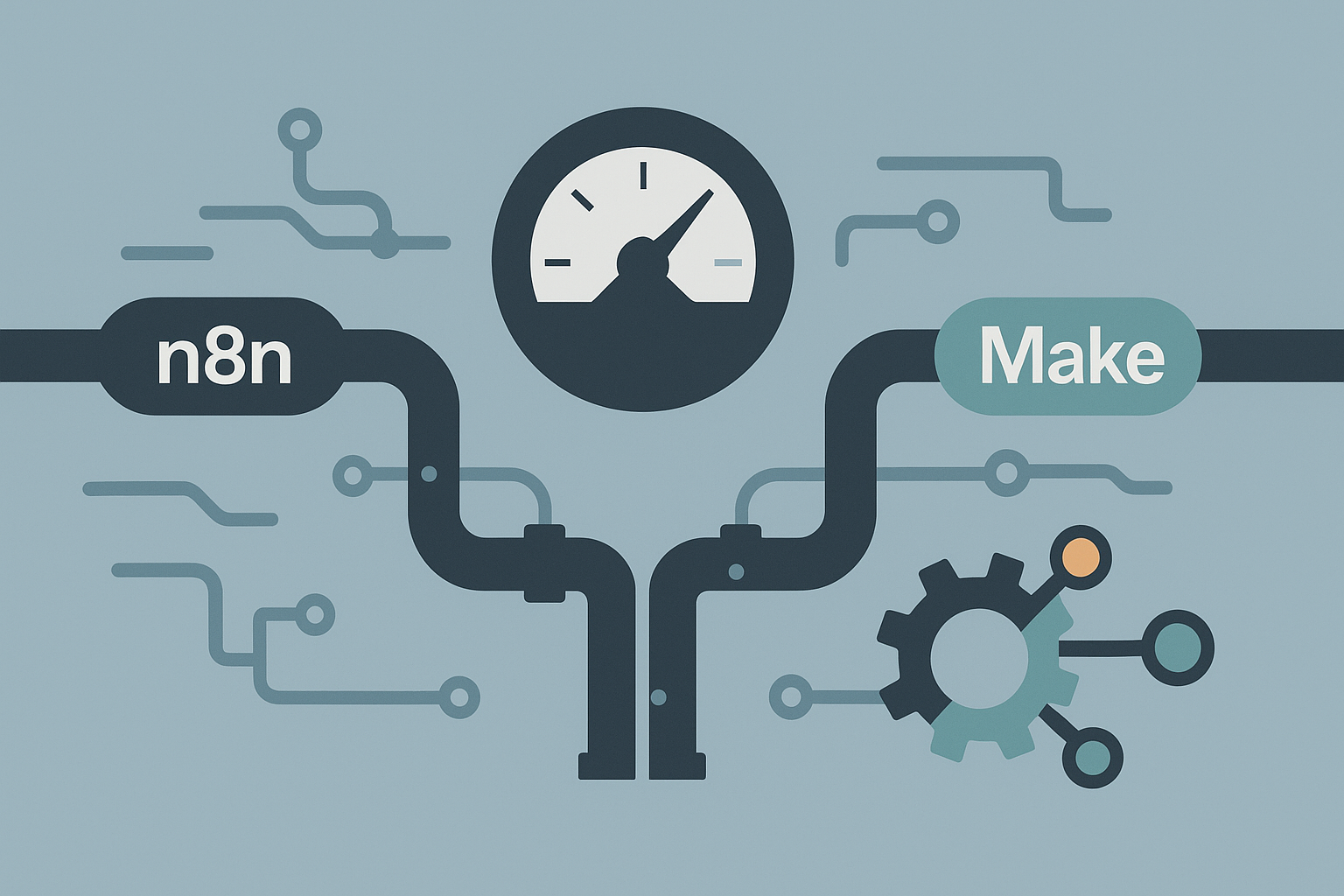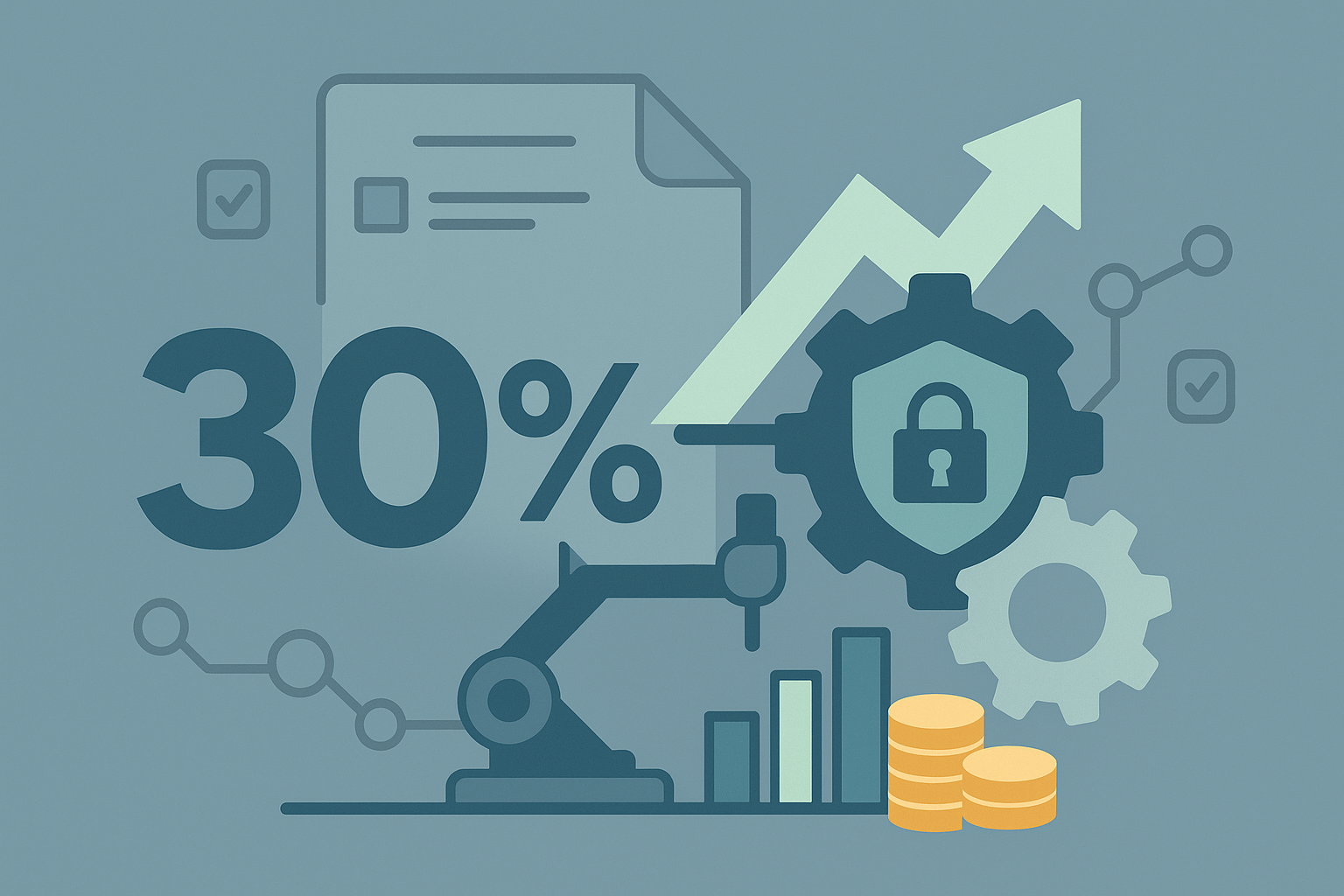n8n vs. Make: Welche Automatisierungsplattform für Sie?
Umfassender Vergleich von n8n und Make (Integromat) für deutsche Unternehmen. Finden Sie die beste Automatisierungsplattform für Ihre Bedürfnisse. Jetzt vergleichen!

n8n vs. Make: Der ultimative Vergleich für deutsche Unternehmen
Die Wahl der richtigen Automatisierungsplattform ist entscheidend für den Erfolg digitaler Transformationsprojekte. n8n und Make (ehemals Integromat) sind zwei führende Lösungen - aber welche passt besser zu deutschen Unternehmen? Als erfahrene Automatisierungsberatung helfen wir Ihnen bei der richtigen Entscheidung.
Executive Summary: Die wichtigsten Unterschiede
| Kriterium | n8n | Make | |-----------|-----|------| | Lizenzmodell | Open Source + Self-Hosted | SaaS-only | | Datenschutz | DSGVO-optimal (lokales Hosting) | DSGVO-konform (EU-Server) | | Preismodell | Sehr kosteneffizient | Premium-Pricing | | Komplexität | Entwickler-freundlich | Business-User-freundlich | | Integrationen | 350+ Nodes | 1.000+ Apps | | Customization | Hoch (Code-basiert) | Mittel (GUI-basiert) | | Support | Community + Professional | Professional |
Detaillierte Plattform-Analyse
n8n: Der Open-Source-Champion
Kerncharakteristika von n8n:
Philosophie: "Fair-code" - Open Source mit kommerziellen Optionen
Zielgruppe: Technisch versierte Teams, Entwickler, Privacy-bewusste Unternehmen
Stärken:
- Vollständige Datenkontrolle
- Unbegrenzte Workflows (Self-Hosted)
- Starke Community
- Keine Vendor Lock-ins
- Deutsche Server möglich
n8n Architektur-Überblick:
graph TD
A[n8n Core Engine] --> B[Node-based Workflow Editor]
A --> C[Trigger Management]
A --> D[Data Processing Layer]
B --> E[350+ Integrations]
C --> F[Webhooks, Cron, Manual]
D --> G[Data Transformation]
E --> H[APIs, Databases, SaaS Tools]
subgraph "Deployment Options"
I[Self-Hosted]
J[n8n Cloud]
K[Docker]
L[Kubernetes]
end
Make: Die Enterprise-Lösung
Kerncharakteristika von Make:
Philosophie: Professional SaaS-Platform für Business Automation
Zielgruppe: Business Teams, Marketing, Operations, Non-Technical Users
Stärken:
- Intuitive Benutzeroberfläche
- Umfangreiche App-Bibliothek
- Professional Support
- Enterprise-Features
- Vorgefertigte Templates
Make Architektur-Überblick:
graph TD
A[Make Platform] --> B[Visual Scenario Builder]
A --> C[Advanced Scheduling]
A --> D[Error Handling & Monitoring]
B --> E[1000+ App Integrations]
C --> F[Time-based, Instant, On-demand]
D --> G[Automatic Retries, Notifications]
E --> H[Enterprise APIs, Webhooks, Databases]
subgraph "Enterprise Features"
I[Team Management]
J[Advanced Analytics]
K[White-label Options]
L[Dedicated Support]
end
Feature-Vergleich im Detail
1. Benutzeroberfläche und Usability
n8n Interface:
// n8n Workflow-Definition (Code + GUI)
{
"nodes": [
{
"parameters": {
"httpMethod": "POST",
"url": "https://api.example.com/webhook",
"options": {
"headers": {
"Authorization": "Bearer {{$node['Get_Token'].json['access_token']}}"
}
}
},
"name": "HTTP Request",
"type": "n8n-nodes-base.httpRequest"
}
],
"connections": {
"Get_Token": {
"main": [
[
{
"node": "HTTP Request",
"type": "main",
"index": 0
}
]
]
}
}
}
n8n Pros:
- Flexibler Code-Editor für erweiterte Logik
- JSON-basierte Datentransformation
- Starke Debugging-Capabilities
- Custom Nodes entwickelbar
n8n Cons:
- Steilere Lernkurve für Non-Developer
- UI weniger poliert als Make
- Mehr technisches Verständnis erforderlich
Make Interface:
Make Pros:
- Sehr intuitive Drag-and-Drop-Oberfläche
- Excellente User Experience
- Vorgefertigte Szenarien-Templates
- Guided Setup für komplexe Integrationen
Make Cons:
- Weniger Flexibilität bei komplexen Logiken
- Schwieriger bei Custom API-Integrationen
- Limitierte Code-Anpassungen
2. Integrationen und Konnektivität
n8n Integration-Landschaft:
// Beliebte n8n Nodes für deutsche Unternehmen
const popularGermanNodes = {
crm: ['HubSpot', 'Salesforce', 'Pipedrive'],
communication: ['Slack', 'Microsoft Teams', 'Discord'],
email: ['Gmail', 'Outlook', 'SendGrid'],
productivity: ['Notion', 'Airtable', 'Google Sheets'],
ecommerce: ['Shopify', 'WooCommerce', 'Magento'],
accounting: ['DATEV (Custom)', 'Lexware (Custom)'],
germanSpecific: ['ELSTER (Custom)', 'DHL', 'Deutsche Post']
}
// Custom Node Entwicklung
const customDATEVNode = {
displayName: 'DATEV',
name: 'datev',
group: ['accounting'],
version: 1,
description: 'Integration mit DATEV-Systemen',
defaults: {
name: 'DATEV'
},
inputs: ['main'],
outputs: ['main'],
credentials: [
{
name: 'datevApi',
required: true
}
],
properties: [
{
displayName: 'Operation',
name: 'operation',
type: 'options',
options: [
{
name: 'Export Buchungen',
value: 'exportBookings'
},
{
name: 'Import Belege',
value: 'importDocuments'
}
]
}
]
}
Make Integration-Landschaft:
// Make App-Kategorien (Auszug)
const makeApps = {
businessApps: {
count: 200+,
examples: ['Salesforce', 'HubSpot', 'Pipedrive', 'Monday.com']
},
googleWorkspace: {
count: 15+,
examples: ['Gmail', 'Google Sheets', 'Google Calendar', 'Google Drive']
},
microsoft365: {
count: 20+,
examples: ['Outlook', 'Teams', 'SharePoint', 'Power BI']
},
ecommerce: {
count: 50+,
examples: ['Shopify', 'WooCommerce', 'Amazon', 'eBay']
},
germanApps: {
count: 10+,
examples: ['DATEV', 'Lexware', 'FastBill', 'invoiz']
}
}
3. Preismodelle im Vergleich
n8n Preisgestaltung:
Self-Hosted (Open Source):
cost: 0€
features:
- Unlimited workflows
- All integrations
- Community support
- Full control
n8n Cloud Starter:
cost: 20€/month
features:
- 5,000 workflow executions
- Cloud hosting
- Basic support
- All integrations
n8n Cloud Pro:
cost: 50€/month
features:
- 50,000 workflow executions
- Priority support
- Advanced logging
- Team collaboration
Enterprise:
cost: "Custom pricing"
features:
- Unlimited executions
- Dedicated support
- SLA guarantees
- On-premise deployment
Make Preisgestaltung:
Core Plan:
cost: 9€/month
features:
- 1,000 operations
- 2 active scenarios
- 15-minute intervals
- Email support
Pro Plan:
cost: 16€/month
features:
- 10,000 operations
- Unlimited scenarios
- 1-minute intervals
- Priority support
Teams Plan:
cost: 29€/month
features:
- 40,000 operations
- Team management
- Advanced features
- Phone support
Enterprise:
cost: "Custom pricing"
features:
- Custom operations
- Dedicated success manager
- SLA guarantees
- Advanced security
TCO-Vergleich (Mittelständisches Unternehmen, 50.000 Operations/Monat):
n8n Self-Hosted:
- Software: 0€
- Server-Hosting (AWS): 100€/Monat
- Wartung/Support: 500€/Monat
- Gesamt: 600€/Monat
n8n Cloud Pro:
- Software: 50€/Monat
- Zusätzliche Executions: 20€/Monat
- Gesamt: 70€/Monat
Make Teams:
- Software: 29€/Monat
- Zusätzliche Operations: 15€/Monat
- Gesamt: 44€/Monat
Datenschutz und Compliance-Vergleich
DSGVO-Compliance-Bewertung
n8n DSGVO-Vorteile:
Datenschutz-Features:
selfHosting:
description: "Vollständige Datenkontrolle auf eigenen Servern"
dsgvoCompliance: "Optimal"
dataProcessing:
description: "Keine Datenverarbeitung durch Dritte"
dsgvoCompliance: "Sehr gut"
dataLocalization:
description: "Deutsche/EU Server möglich"
dsgvoCompliance: "Perfekt"
auditability:
description: "Vollständige Transparenz des Codes"
dsgvoCompliance: "Excellent"
Compliance-Score: 9.5/10
Make DSGVO-Vorteile:
Datenschutz-Features:
serverLocation:
description: "EU-Server (Frankfurt, Dublin)"
dsgvoCompliance: "Gut"
certifications:
description: "SOC 2, ISO 27001, GDPR certified"
dsgvoCompliance: "Sehr gut"
dataProcessing:
description: "DSGVO-konforme Auftragsverarbeitung"
dsgvoCompliance: "Gut"
dataRetention:
description: "Konfigurierbare Löschfristen"
dsgvoCompliance: "Gut"
Compliance-Score: 8.0/10
Sicherheits-Features
n8n Sicherheit:
// n8n Security Configuration
const n8nSecurityConfig = {
authentication: {
methods: ['basic', 'ldap', 'saml', 'oauth2'],
mfa: 'available_in_enterprise',
sso: 'supported'
},
encryption: {
dataAtRest: 'aes_256',
dataInTransit: 'tls_1.3',
credentials: 'encrypted_storage'
},
network: {
vpn: 'self_hosted_support',
privateNetworks: 'full_support',
ipWhitelisting: 'available'
},
compliance: {
soc2: 'enterprise_only',
iso27001: 'self_certification_possible',
gdpr: 'by_design'
}
}
Make Sicherheit:
// Make Security Features
const makeSecurityConfig = {
authentication: {
methods: ['saml', 'oauth2', 'basic'],
mfa: 'standard',
sso: 'enterprise'
},
encryption: {
dataAtRest: 'aes_256',
dataInTransit: 'tls_1.3',
credentials: 'vault_storage'
},
compliance: {
soc2: 'type_ii_certified',
iso27001: 'certified',
gdpr: 'certified',
hipaa: 'available'
},
monitoring: {
activityLogs: 'comprehensive',
alerting: 'real_time',
audit_trails: 'complete'
}
}
Use-Case-spezifische Empfehlungen
Für Startups und kleinere Unternehmen
n8n empfohlen bei:
Unternehmensprofile:
- Technisch versierte Teams
- Budget-bewusste Unternehmen
- Datenschutz-kritische Branchen
- Flexible/experimentelle Workflows
Beispiel-Szenarien:
- E-Commerce-Startup mit besonderen Integrationsanforderungen
- Software-Unternehmen mit eigener Infrastruktur
- Beratungsunternehmen mit individuellen Kundenprozessen
Vorteile:
- Sehr niedrige Betriebskosten
- Unbegrenzte Experimentierfreude
- Volle Kontrolle über Daten und Prozesse
Make empfohlen bei:
Unternehmensprofile:
- Business-fokussierte Teams ohne IT-Abteilung
- Schnelle Implementierung gewünscht
- Standard-Business-Prozesse
- Wenig Zeit für technische Details
Beispiel-Szenarien:
- Marketing-Agentur mit Standard-Tool-Stack
- Traditioneller Mittelstand ohne IT-Team
- Schnell wachsende Unternehmen mit Standard-Prozessen
Vorteile:
- Sehr schnelle Time-to-Value
- Professioneller Support
- Bewährte Templates und Best Practices
Für mittlere Unternehmen (50-500 Mitarbeiter)
Hybrid-Ansatz oft optimal:
graph TD
A[Business Requirements Assessment] --> B{Komplexität der Integrationen}
B -->|Hoch| C[n8n für Custom Workflows]
B -->|Standard| D[Make für Business Processes]
C --> E[n8n Self-Hosted]
D --> F[Make Teams/Enterprise]
E --> G[Kombination beider Plattformen]
F --> G
G --> H[Optimal: Best of Both Worlds]
Implementierungsstrategie:
// Mittelstand-Implementierung: Hybrid-Approach
const hybridStrategy = {
phase1: {
tool: 'Make',
scope: 'standard_business_processes',
timeframe: '1-2_months',
examples: [
'CRM-Marketing-Integration',
'Lead-Nurturing-Workflows',
'Standard-Reporting'
]
},
phase2: {
tool: 'n8n',
scope: 'custom_complex_integrations',
timeframe: '3-6_months',
examples: [
'ERP-System-Integration',
'Custom-API-Entwicklung',
'Compliance-Workflows'
]
},
phase3: {
approach: 'optimization',
scope: 'cost_and_performance_optimization',
decisions: [
'Migrate_standard_workflows_to_n8n_for_cost_savings',
'Keep_complex_business_logic_in_Make_for_maintainability'
]
}
}
Für Enterprise-Unternehmen
Entscheidungsmatrix:
n8n Enterprise wenn:
requirements:
- Höchste Datenschutzanforderungen
- Komplexe, individuelle Integrationen
- Große Anzahl von Workflows (>1000)
- Eigene IT-Infrastruktur vorhanden
- Langfristige Kostenkontrolle wichtig
industries:
- Finanzdienstleistungen
- Gesundheitswesen
- Regierung/Öffentlicher Sektor
- Forschungseinrichtungen
Make Enterprise wenn:
requirements:
- Schnelle Skalierung erforderlich
- Business-User-Autonomie wichtig
- Umfangreicher Support benötigt
- Standard-Business-Prozesse dominieren
- Zeit-kritische Implementierung
industries:
- Handel und E-Commerce
- Marketing und Werbung
- Dienstleistungsunternehmen
- Fertigungsunternehmen (Standard-Prozesse)
Performance und Skalierbarkeit
n8n Performance-Charakteristika
Skalierungsmodell:
// n8n Horizontal Scaling Configuration
const n8nScaling = {
architecture: 'microservices_ready',
scaling_options: {
single_instance: {
max_workflows: 'unlimited',
max_executions_per_minute: 1000,
memory_usage: '1-4GB',
suitable_for: 'small_to_medium_workloads'
},
clustered_setup: {
instances: 'multiple_workers',
load_balancing: 'queue_based',
database: 'postgresql_mysql_shared',
suitable_for: 'enterprise_workloads'
},
kubernetes: {
auto_scaling: 'pod_based',
resource_management: 'automatic',
high_availability: '99.9%_uptime',
suitable_for: 'cloud_native_environments'
}
},
performance_optimization: {
caching: 'redis_integration',
queue_management: 'bull_queue',
database_optimization: 'connection_pooling',
monitoring: 'prometheus_grafana'
}
}
Make Performance-Charakteristika
SaaS-Skalierung:
// Make Platform Characteristics
const makeScaling = {
architecture: 'managed_saas_platform',
performance_limits: {
core_plan: {
operations_per_month: 1000,
scenario_limit: 2,
execution_interval: '15_minutes',
data_transfer: '100MB'
},
teams_plan: {
operations_per_month: 40000,
scenario_limit: 'unlimited',
execution_interval: '1_minute',
data_transfer: '10GB'
},
enterprise: {
operations_per_month: 'custom',
priority_execution: 'guaranteed',
dedicated_resources: 'available',
sla: '99.9%_uptime'
}
},
managed_benefits: {
auto_scaling: 'transparent',
maintenance: 'zero_downtime_updates',
monitoring: 'built_in_dashboards',
support: '24_7_available'
}
}
Entwickler-Experience und Community
n8n Developer Community
Community-Stärken:
Open Source Ecosystem:
github_stars: 35000+
contributors: 500+
community_nodes: 200+
forum_activity: "sehr hoch"
Development Resources:
documentation: "umfassend"
tutorials: "community_driven"
code_examples: "open_source"
custom_node_development: "gut_dokumentiert"
German Community:
activity: "wachsend"
meetups: "regelmäßig"
german_documentation: "community_maintained"
local_support: "community_based"
Make Business Community
Professional Ecosystem:
Business Community:
certified_partners: 200+
solution_providers: 500+
template_library: 1000+
user_community: "sehr_aktiv"
Support Resources:
documentation: "professionell"
training_programs: "zertifiziert"
webinars: "regelmäßig"
customer_success: "dedicated_managers"
German Market:
local_partners: 20+
german_support: "professional"
compliance_expertise: "zertifiziert"
industry_templates: "verfügbar"
Migration und Integration
Von anderen Plattformen migrieren
Migration zu n8n:
// Migration Workflow Example: Zapier zu n8n
const migrationStrategy = {
assessment: {
tools: ['zapier_export_analyzer', 'workflow_complexity_assessment'],
timeline: '1-2_weeks',
deliverables: ['migration_plan', 'complexity_report', 'resource_requirements']
},
migration_phases: {
phase1_simple_workflows: {
complexity: 'low',
effort: '1-2_days_per_workflow',
automation: 'partial_automation_possible',
examples: ['webhook_to_email', 'form_to_spreadsheet']
},
phase2_medium_complexity: {
complexity: 'medium',
effort: '3-5_days_per_workflow',
custom_development: 'likely_required',
examples: ['multi_step_crm_workflows', 'conditional_logic']
},
phase3_complex_workflows: {
complexity: 'high',
effort: '1-2_weeks_per_workflow',
redesign: 'recommended',
examples: ['complex_data_transformations', 'multi_system_orchestration']
}
}
}
Migration zu Make:
// Migration Strategy: Zapier/n8n zu Make
const makeTransition = {
advantages: {
similar_concepts: 'scenario_based_thinking',
import_tools: 'available_for_major_platforms',
template_library: 'extensive_pre_built_scenarios',
support: 'migration_assistance_included'
},
migration_approach: {
discovery: {
tool: 'make_import_wizard',
supported_platforms: ['zapier', 'integromat', 'microsoft_power_automate'],
timeline: '1_week'
},
recreation: {
method: 'visual_scenario_builder',
complexity: 'medium',
timeline: '2-4_weeks_depending_on_scope'
},
optimization: {
focus: 'leverage_make_specific_features',
advanced_features: ['error_handling', 'data_stores', 'custom_apps'],
timeline: '1-2_weeks'
}
}
}
Entscheidungshilfe-Framework
Bewertungskriterien-Matrix
// Entscheidungsframework für deutsche Unternehmen
const decisionMatrix = {
technical_requirements: {
weight: 0.3,
factors: {
complexity_of_integrations: {
n8n_score: 9,
make_score: 7,
reasoning: "n8n bietet mehr Flexibilität für Custom APIs"
},
developer_resources: {
n8n_score: 8,
make_score: 6,
reasoning: "n8n erfordert mehr technische Expertise"
},
customization_needs: {
n8n_score: 10,
make_score: 6,
reasoning: "n8n ermöglicht unbegrenzte Anpassungen"
}
}
},
business_requirements: {
weight: 0.25,
factors: {
time_to_market: {
n8n_score: 6,
make_score: 9,
reasoning: "Make ermöglicht schnellere Implementierung"
},
user_friendliness: {
n8n_score: 6,
make_score: 9,
reasoning: "Make hat intuitivere Benutzeroberfläche"
},
support_requirements: {
n8n_score: 7,
make_score: 9,
reasoning: "Make bietet professionellen Support"
}
}
},
compliance_and_security: {
weight: 0.25,
factors: {
data_privacy: {
n8n_score: 10,
make_score: 8,
reasoning: "n8n ermöglicht vollständige Datenkontrolle"
},
gdpr_compliance: {
n8n_score: 10,
make_score: 8,
reasoning: "Self-hosting gibt absolute DSGVO-Kontrolle"
},
security_features: {
n8n_score: 8,
make_score: 9,
reasoning: "Make hat mehr Enterprise-Security-Features"
}
}
},
cost_considerations: {
weight: 0.2,
factors: {
initial_costs: {
n8n_score: 10,
make_score: 7,
reasoning: "n8n Open Source hat niedrigere Startkosten"
},
long_term_costs: {
n8n_score: 9,
make_score: 6,
reasoning: "n8n skaliert günstiger bei hohem Volumen"
},
total_cost_of_ownership: {
n8n_score: 8,
make_score: 7,
reasoning: "Abhängig von technischen Ressourcen"
}
}
}
}
// Automatische Bewertungsberechnung
const calculateRecommendation = (requirements) => {
let n8nScore = 0
let makeScore = 0
for (const [category, config] of Object.entries(decisionMatrix)) {
const categoryWeight = config.weight
for (const [factor, scores] of Object.entries(config.factors)) {
const userImportance = requirements[factor] || 0.5 // Default-Gewichtung
n8nScore += scores.n8n_score * categoryWeight * userImportance
makeScore += scores.make_score * categoryWeight * userImportance
}
}
return {
n8n_score: n8nScore,
make_score: makeScore,
recommendation: n8nScore > makeScore ? 'n8n' : 'make',
confidence: Math.abs(n8nScore - makeScore) / Math.max(n8nScore, makeScore)
}
}
Praxisbeispiele und Case Studies
Case Study 1: E-Commerce-Unternehmen (n8n)
Unternehmen: Mittelständischer Online-Händler, 150 Mitarbeiter
Herausforderung:
- Komplexe Produktdaten-Synchronisation zwischen ERP, Shop, Marktplätzen
- DSGVO-kritische Kundendatenverarbeitung
- Hohe Automatisierungsvolumen (>100k Operations/Monat)
- Begrenzte IT-Budgets
n8n-Lösung:
// Produktdaten-Synchronisation Workflow
const ecommerceWorkflow = {
trigger: 'ERP_Product_Update',
steps: [
{
name: 'data_validation',
action: 'validate_product_data_completeness'
},
{
name: 'image_processing',
action: 'optimize_and_resize_product_images'
},
{
name: 'seo_optimization',
action: 'generate_seo_optimized_descriptions'
},
{
name: 'multi_channel_sync',
parallel: [
'update_shopify_store',
'sync_amazon_catalog',
'update_ebay_listings',
'sync_google_shopping'
]
},
{
name: 'inventory_tracking',
action: 'update_stock_levels_across_channels'
}
],
error_handling: {
retry_attempts: 3,
fallback: 'manual_review_queue',
notification: 'slack_alert'
}
}
Ergebnisse:
- 80% Kosteneinsparung vs. Make (Self-Hosted)
- 100% Datenschutz-Compliance durch deutsche Server
- 24/7 Automatisierung ohne Operations-Limits
- ROI: 450% im ersten Jahr
Case Study 2: Marketing-Agentur (Make)
Unternehmen: Digital Marketing Agentur, 25 Mitarbeiter
Herausforderung:
- Schnelle Client-Onboarding-Prozesse
- Integration verschiedener Marketing-Tools
- Non-Technical Team
- Skalierung ohne zusätzliche IT-Ressourcen
Make-Lösung:
// Client-Onboarding-Automatisierung
const agencyWorkflow = {
trigger: 'New_Client_CRM_Entry',
automated_setup: [
{
step: 'create_google_ads_account',
template: 'agency_standard_setup'
},
{
step: 'setup_facebook_business_manager',
template: 'social_media_campaign_starter'
},
{
step: 'configure_analytics_tracking',
tools: ['Google Analytics', 'Google Tag Manager', 'Facebook Pixel']
},
{
step: 'create_reporting_dashboard',
template: 'client_monthly_report'
}
],
client_communication: [
{
step: 'send_welcome_email',
template: 'personalized_client_welcome'
},
{
step: 'schedule_kickoff_meeting',
integration: 'calendly_automatic_booking'
},
{
step: 'create_shared_workspace',
tools: ['Slack Channel', 'Google Drive Folder', 'Trello Board']
}
]
}
Ergebnisse:
- 60% Reduzierung Client-Onboarding-Zeit
- 0 IT-Aufwand für das Team
- Standardisierte, wiederholbare Prozesse
- ROI: 320% durch Effizienzgewinne
Key Takeaways
- n8n: Open Source, Self-Hosted Option, ideal für hohe Datenschutzanforderungen und komplexe Integrationen
- Make: SaaS-Lösung mit intuitiver Oberfläche, perfekt für Business-Teams ohne IT-Kenntnisse
- Preisvergleich: n8n günstiger bei hohen Automatisierungsvolumen, Make transparenter bei kleinen Projekten
- DSGVO-Compliance: n8n bietet vollständige Datenkontrolle, Make ist DSGVO-konform mit EU-Servern
- Hybrid-Ansatz: Kombination beider Plattformen oft optimal für mittlere bis große Unternehmen
- ROI: Beide Plattformen amortisieren sich typischerweise innerhalb von 6-12 Monaten
Häufig gestellte Fragen (FAQ)
Was ist der Hauptunterschied zwischen n8n und Make?
Der Hauptunterschied liegt im Lizenzmodell: n8n ist Open Source und kann selbst gehostet werden, während Make eine reine SaaS-Lösung ist. n8n bietet mehr Kontrolle und Flexibilität, Make punktet mit Benutzerfreundlichkeit und professionellem Support.
Welche Plattform ist günstiger - n8n oder Make?
Bei geringen Automatisierungsvolumen ist Make oft günstiger (ab 9€/Monat). Bei hohen Volumen (>50.000 Operations/Monat) wird n8n Self-Hosted deutlich kosteneffizienter. Die genauen Kosten hängen von Ihren spezifischen Anforderungen ab.
Kann ich von Make zu n8n (oder umgekehrt) wechseln?
Ja, eine Migration ist möglich. Für einfache Workflows dauert die Migration 1-2 Tage pro Workflow. Komplexe Workflows müssen oft neu konzipiert werden. Wir empfehlen eine schrittweise Migration mit Pilot-Projekten.
Welche Plattform ist besser für DSGVO-Compliance?
n8n bietet durch Self-Hosting die beste DSGVO-Compliance mit vollständiger Datenkontrolle. Make ist ebenfalls DSGVO-konform mit EU-Servern, aber Daten werden extern verarbeitet. Für hochsensible Daten empfehlen wir n8n.
Benötige ich Programmierkenntnisse für n8n?
Grundlegende JSON-Kenntnisse sind hilfreich, aber nicht zwingend erforderlich. Für komplexe Workflows und Custom Nodes sind JavaScript-Kenntnisse von Vorteil. Make erfordert keine Programmierkenntnisse.
Kann ich beide Plattformen parallel nutzen?
Absolut! Viele unserer Kunden nutzen einen Hybrid-Ansatz: Make für Standard-Business-Prozesse und n8n für komplexe, datenschutzkritische Integrationen. Dies kombiniert die Vorteile beider Plattformen optimal.
Fazit und Empfehlungen
Die richtige Wahl treffen
Wählen Sie n8n wenn:
- Hohe Datenschutzanforderungen vorliegen
- Technische Expertise im Team vorhanden ist
- Langfristige Kostenoptimierung wichtig ist
- Komplexe, individuelle Integrationen erforderlich sind
- Volle Kontrolle über Automatisierungsplattform gewünscht wird
Wählen Sie Make wenn:
- Schnelle Implementierung Priorität hat
- Business-User selbständig arbeiten sollen
- Professioneller Support erforderlich ist
- Standard-Business-Prozesse automatisiert werden
- Minimaler IT-Aufwand gewünscht wird
Hybrid-Strategie als optimaler Ansatz
Für viele deutsche Unternehmen kann eine Kombination beider Plattformen optimal sein:
- Make für Standard-Prozesse: Marketing, CRM, Standard-Integrationen
- n8n für komplexe Workflows: ERP-Integration, Custom APIs, DSGVO-kritische Prozesse
Implementierungsempfehlung
graph TD
A[Automatisierungsstrategie definieren] --> B{Budget und technische Ressourcen bewerten}
B -->|Hohe tech. Kompetenz| C[n8n evaluieren]
B -->|Business-User-Fokus| D[Make evaluieren]
C --> E[Pilot-Projekt starten]
D --> E
E --> F[Skalierung planen]
F --> G{Weitere Anforderungen?}
G -->|Ja| H[Hybrid-Ansatz evaluieren]
G -->|Nein| I[Vollständige Implementierung]
H --> I
Die Wahl zwischen n8n und Make hängt stark von den spezifischen Anforderungen, Ressourcen und strategischen Zielen Ihres Unternehmens ab. Beide Plattformen haben ihre Berechtigung im deutschen Markt und können bei richtiger Anwendung erhebliche Effizienzgewinne erzielen.
Benötigen Sie Unterstützung bei der Auswahl und Implementierung der richtigen Automatisierungsplattform? Kontaktieren Sie uns für eine kostenlose Beratung. Unsere Experten helfen Ihnen bei der Evaluierung, dem Setup und der optimalen Nutzung von n8n oder Make für Ihre spezifischen Anforderungen. Erfahren Sie mehr über unsere KI & Automation Services und wie wir Ihren Automatisierungserfolg sicherstellen.


